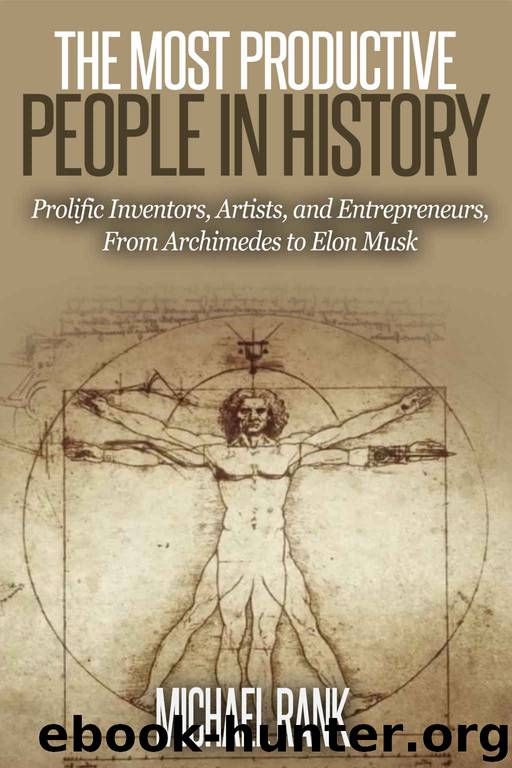The Most Productive People in History: 18 Extraordinarily Prolific Inventors, Artists, and Entrepreneurs, From Archimedes to Elon Musk by Michael Rank

Author:Michael Rank
Language: eng
Format: mobi
Publisher: Five Minute Books
Published: 2015-04-28T14:00:00+00:00
Chapter 11
Justinian the Great (482-565)
Justinian I of Byzantium was a pivotal figure between the ancient and medieval periods. He rose to imperial power in 527 AD and reacquired Roman lands in Europe that were lost a century before to Vandal and Ostrogothic invasions. He removed the rotting branches of his administration, replacing bureaucrats from the aristocracy with independent counselors. His successes looked to the past glories of the empire but also to the future. Once again the Roman Empire stretched out to the Atlantic Ocean, bringing in vast amounts of tribute from the reconquered territory. But Justinian also rewrote the Roman law, the Corpus Juris Civilis. Early in his reign he commissioned a legal expert in his court, Tribonian, to gather together legal commentaries and laws of the Roman legal system into a single text that would hold the force of law. It was composed in Latin and is still the basis of civil law in many of the empire's descendant states.
But the reason for Justinian's far-reaching influence is not for his administrative brilliance or force of character. These qualities allowed him to succeed, but they did not create the initial conditions that allowed him to consolidate his power and easily wipe out his foes. The reason for his successes come from a far more unlikely source. According to one author, Justinian owes his productive genius and influential imperial reign to the bubonic plague. The flea that carried the bacillus created conditions for the formation of modern Europe.
According to William Rosen, author of Justinian's Flea, the first severe outbreak of the bubonic plague devastated the Mediterranean world, slashing its labor force, which caused significant changes in wages and worker mobility. Over 100 million died. Historians have made similar arguments about the economic transformations that the 14th-century Black Plague wrought on medieval Europe, but Rosen says such reforms actually began in the 6th century. With a quarter of the population dead, the resulting labor shortage drove up wages and costs for agricultural production and military service.
Download
This site does not store any files on its server. We only index and link to content provided by other sites. Please contact the content providers to delete copyright contents if any and email us, we'll remove relevant links or contents immediately.
The Vikings: Conquering England, France, and Ireland by Wernick Robert(79845)
Ali Pasha, Lion of Ioannina by Eugenia Russell & Eugenia Russell(40103)
The Conquerors (The Winning of America Series Book 3) by Eckert Allan W(36960)
The Vikings: Discoverers of a New World by Wernick Robert(36903)
Cecilia; Or, Memoirs of an Heiress — Volume 1 by Fanny Burney(32396)
Cecilia; Or, Memoirs of an Heiress — Volume 3 by Fanny Burney(31776)
Cecilia; Or, Memoirs of an Heiress — Volume 2 by Fanny Burney(31747)
Empire of the Sikhs by Patwant Singh(22923)
The Secret History by Donna Tartt(18787)
Hans Sturm: A Soldier's Odyssey on the Eastern Front by Gordon Williamson(18448)
Cat's cradle by Kurt Vonnegut(15126)
Pimp by Iceberg Slim(14258)
Sapiens: A Brief History of Humankind by Yuval Noah Harari(14184)
Talking to Strangers by Malcolm Gladwell(13157)
Norse Mythology by Gaiman Neil(13155)
Leonardo da Vinci by Walter Isaacson(13128)
4 3 2 1: A Novel by Paul Auster(12245)
Underground: A Human History of the Worlds Beneath Our Feet by Will Hunt(11992)
The Radium Girls by Kate Moore(11886)
